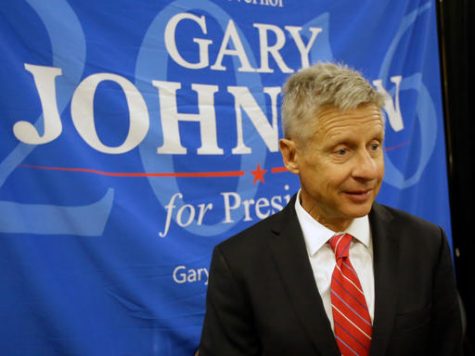Third Party Candidates’ Effects on Election
September 26, 2016
Contrary to popular opinion, there are more options for President this election than Secretary of State and former first lady Hillary Clinton and billionaire real estate tycoon Donald Trump.
There are plenty of third parties in the United States, and three with over 75,000 registered members: The Green Party, the Libertarian Party, and the Constitution Party. This election year, the two major candidates have shown in poll after poll to have some of the worst “unfavorable” ratings in modern history. This was shown in a poll by CBS News. Because of this, there are many voters looking to third parties. This was shown in the primaries when there were up to 17 Republican candidates, and the almost unknown Bernie Sanders came close nomination.
Hillary Clinton’s campaign has been plagued by scandals relating to deleted emails and the Clinton Foundation, and Donald Trump’s by legitimacy concerns relating to his university and accusations of racism and sexism. So the question that needs to be answered is who is the lesser evil. Right?
No. The question that many are asking is, “what are the other options?”
So far, the two most viable third party candidates are Dr. Jill Stein of the Green Party, and Gary Johnson of the Libertarians. The Green Party represents progressive leftist views, supporting causes like environmentalism, gender equality, and social justice. The Libertarians, on the other hand, have views such as laissez-faire capitalism, non-interventionism, and civil liberties.
Between the two parties, there has only been one election season in which either of the them gained more than one percent of the vote; Ralph Nader of the Green Party took 2.74 percent in 2000. The two parties are expected to finally break that record this year.

According to a recent poll by CBS News, Stein and Johnson own four and eight percent, respectively, of the national vote. A Monmouth University poll showed 49 percent of voters find Clinton unfavorable, and 56 percent for Trump. This indicates that neither of the two candidates are very well liked, so there is sure to be a large number of third party votes. A poll by the Wall Street Journal shows just that; 47 percent of voters would consider voting third party.
A popular perception among voters is that a vote for a third party candidate is a vote lost, because third parties will never have an impact. But even if the candidate doesn’t win, if a good amount of votes go to that nominee, it is very possible that a major party could adopt some of the third party’s views for their own platform.
For example, in 1992, Ross Perot ran as an independent with a platform focused on national debt, and garnered 19 percent of the vote. When politicians realized that over 19 million people were concerned about national debt as well, the issue received national attention. Perot didn’t win the election, but his campaign still had a national impact.
Both of the two main third party candidates can have this impact in 2016. According to Marc Joffe of The Fiscal Times, Stein received 469 thousand, or about 0.36 percent, of the national vote in 2012. If she could build on that this year, she’ll reinforce former Democratic nominee Bernie Sanders’ message that the Democrats should move further left. 1.28 million people, or 0.99 percent of the population, voted for Johnson in 2012. If that number grows this year, the Republicans could be pushed more in the direction of the Libertarian platform.
Not only can a third party have massive impact on party platforms, but with the right amount of votes in the right places, they could win the election. This may seem like a stretch, but in this extremely close race, the election will most likely come down to a few states. According to an article on The Federalist by Josiah Peterson, Gary Johnson could take New Mexico, the state he formerly governed. Then a situation could be created where neither Trump nor Clinton reach the 270 required delegates to win, also stated in an article from the Denver Post. In this case, the election would come down to a vote by the House of Representatives. It is likely that the representatives could compromise on a third party candidate.
The point of an election is to choose a leader of the country for the next term. Although the leader chosen this year probably won’t be a member of the Libertarian or the Green Party, a vote for either of those candidates will not be wasted vote.





